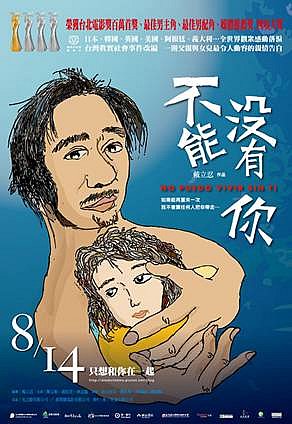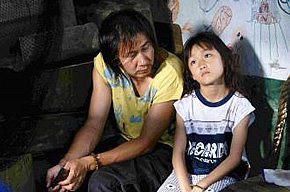In Hakka, Min Nan and Mandarin
Genre: Drama
Director: Leon Dai
Cast: Chen Wen-Pin, Chao Yo-Hsuan, Lin Chih-Ju
RunTime: 1 hr 35 mins
Released By: Festive Films
Rating: PG
Official Website: http://www.festivefilms.com/nopuedo/
Opening Day: 24 December 2009
Synopsis:
Based on a true story and powered by a gripping and very natural
realism, No puedo vivir sin ti (Spanish for ‘I can’t
live without you’) tells the story of Li Wu-hsiung,
a middle-aged man in Taiwan who makes a meagre living by doing
odd-jobs for little money (and sometimes even putting his
own life at risk). He has a young girl whose mother went away
years ago, leaving father and daughter alone – and very
much together. However Li is not her legal guardian, a situation
which becomes a problem when he tries to enrol her in school
so that she can have a better future. The government decides
it's in the child's best interest to remove her from his care.
He does everything he can to get her back, leading to a desperate
standoff in front of the media and the world.
Based
on a true story, it conveys a quest of love that knows no
bounds.
Movie Review:
Before this reviewer begins talking about the highly acclaimed
Taiwanese film “Not Without You”, here’s
a local news snippet you should know. Just last month, a Singapore
High Court judge returned custody of a 7-year old girl taken
away by Child Protection Services (CPS) from her parents back
to their care. The child had apparently been taken away during
school hours and placed subsequently in a children’s
home. Her parents were only informed after the deed, but did
not know why she was being separated from them. They were
also not allowed to visit the girl at the children’s
home, or at school and its vicinity.
Leon
Dai’s unassuming movie is also based on a similar true
story back in Taiwan. In 2003 Taipei, a lowly, uneducated
man threatened to jump off a pedestrian bridge with his 7-year
old daughter after the authorities threatened to take her
away from him. Their reason- he was not the legal guardian
of the child, even though he is her biological father, as
her mother was already married to someone else when the child
was conceived. So unless her absent mother and nonexistent
stepfather relinquished care of the child, the authorities
were going to take her away.
Really,
the questions that beg answering are these- does the state
always know better? Is the state a better parent than a child’s
own? Does the state always know what’s best for the
child’s upbringing? And in what circumstances should
the state intervene to remove a child from his/her parent(s)’
care? Indeed, “Not Without You” will have you
thinking about these questions as it tells a simple yet genuinely
touching story of a father who, though poor, has held nothing
back from providing for his daughter.
In
portraying the bond between father and daughter, director
Leon Dai shows admirable restraint from typical melodrama.
Instead, he displays their kinship through the rhythm they
share as they go about their everyday lives- the daughter
peering off the deck of a bumboat patiently waiting for her
father who has gone ship repairing deep underwater or the
daughter pulling up their catch of the day while her father
prepares to cook dinner.
Such
routine events are interspersed with other spontaneous happenings-
in particular, there is a gentle episode where the father
offers the sweeter fruit to his daughter after one supports
the other to pluck fruits from a roadside tree. Quite surprisingly,
there are no mentions of “I love you” or overt
hugs or kisses throughout the movie. There is no need to-
for in their little actions, the audience is shown and feels
the immense love between father and daughter.
Of
course, this becomes a perfect setup when the authorities
finally catch up to the father. By then, your sympathies are
firmly with this man, an unfortunate victim of bureaucracy
that has scant regard for the very people and their families
most affected by its workings. That sense of injustice one
feels is further compounded by the empty promises these bureaucrats
make, who seem unsympathetic to the common man helpless against
an overly rigid and impersonal system.
That
sentiment no doubt struck a chord in the hearts of many Taiwanese
viewers, and propelled the movie to sweep the most number
of trophies at the recently-concluded Golden Horse Awards,
including Best Picture. It is even more starkly when told
in monochrome- director Leon Dai wanting to relate the story
in an almost-documentary fashion to underscore the reality
behind it.
To know that it actually happened only drives home further
the myriad of emotions and thoughts running through one’s
head from watching this poignant movie- anger, injustice,
empathy, frustration. Some may say that it is a one-sided
portrayal and that it is, but the movie is no less compelling
because of it. Rather, it is an awakening against nonchalance
and complacency, a reminder that the ones who may suffer as
a result are real people and real families. Besides, if our
local incident is anything to go by, what’s depicted
here in Taiwan as a consequence of that indifference may one
day hit home.
Movie Rating:
   
(Genuinely moving and affecting, this is one of the
best social dramas of the year)
Review by Gabriel Chong
|



